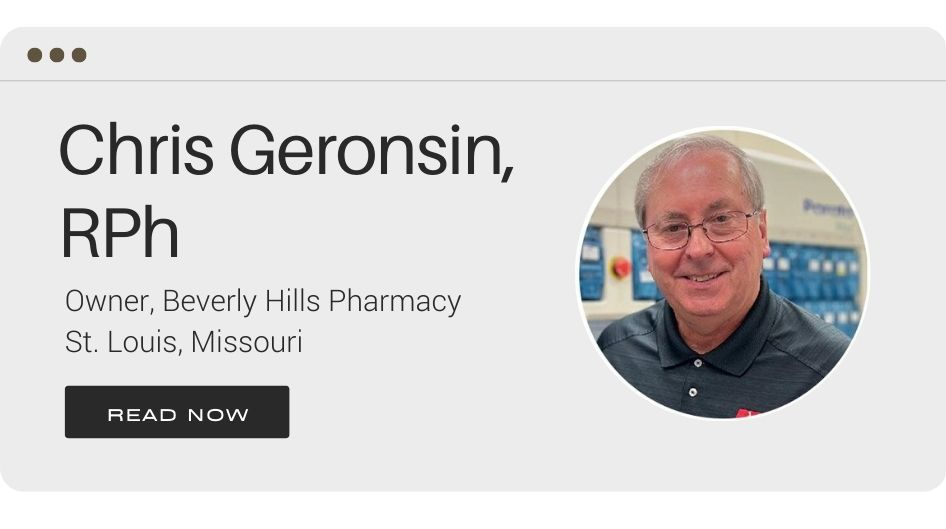How one pharmacy continues to grow its family of customers and services
Chris Geronsin, manager of Beverly Hills Pharmacy in Beverly Hills, Missouri, doesn’t mind that in a post-COVID-19 world, his customers come into his store for more than just a prescription refill or a question about their medications. In fact, he prefers it.
These conversations have made a huge pivot in the direction of his pharmacy, and while it took a global pandemic to change the course of his store, he’s grateful for the lessons learned. It’s safe to say that Chris’s eyes are wide open not only to the future of pharmacy, but also to his own pharmacy.
A shift in conversations
When Geronsin opened his store, there were just two people at the helm. Over time, the pharmacy grew to 25 employees, one of whom is his wife. It’s not just staff, he says; it’s family.
Together, his family historically served a robust manufacturing community that has since depleted and is now left with a population of aging baby boomers. His conversations with customers were very surface-level and routine — very “in-and-out” interactions.
And then COVID-19 hit, and the vaccine became available. It was at this moment that everything changed at Beverly Hills Pharmacy.
“People started calling or coming back into the store, wanting to know what we knew about the pandemic,” says Geronsin.
Together, pharmacist and customers started talking — not only about the news but also about their personal healthcare needs. The exchanges became less transactional and more conversational. Customers would tell Geronsin that the flu typically hits their families hard during the flu season. He would talk to them about the benefits of a flu shot, which led to the same conversations around shingles and pneumonia vaccines. He began to help them on a more comprehensive-care level. More and more, customers started calling to make appointments for vaccines, flu shots and more. Geronsin and his staff at Beverly Hills Pharmacy never turned a customer away.
Geronsin says his customers became regulars. “They became a part of the pharmacy, just like the very people who work here,” he said.
The window of opportunity
As new doors continued to open, Geronsin and his staff saw an opportunity to offer chronic care management services. They got to know their customers’ medical journey and what they could do to help them from a pharmaceutical standpoint. He was interacting with them on a whole different level.
“It became a huge opportunity for the future of our pharmacy. You hate to say tragedy was a great experience, but for our pharmacy, 2020 and 2021 opened our eyes to what pharmacists can really do,” he said.
Today, Geronsin wants his pharmacy to have more access to patients’ electronic medical records (EMR) so he and his staff can be a part of the patient’s care team and their journey.
“[EMRs are] the opening pharmacies need to get involved in billing and are the future of pharmacy,” he said.
Geronsin explains that when his pharmacy first began to look into how it could further integrate into a patient’s care team, he received pushback from some groups of people who felt Geronsin and his staff were encroaching on their territory. But after he spoke up and said, “Hey, we’re here to do some good. We talked about how we could help with annual wellness visits and related paperwork,” the lightbulb went off. Now other healthcare practitioners see Beverly Hills Pharmacy as an asset and not a competitor. “They would say, ‘Oh, wow,’” said Geronsin. “You can actually help us!'”
Becoming a member of patient healthcare networks
Beverly Hills Pharmacy began helping with annual wellness visits and were soon considered a part of the “team” by nurse practitioners and area physicians. With chronic care management services now in their wheelhouse, Geronsin hired an in-house medical director who helps them connect with other physicians in the area. The medical director also helps with protocol.
Now, using Cardinal Health™ Outcomes™ and Reconciliation Programs*, Geronsin’s pharmacy receives alerts when patients are not taking their medicine. He heard about these programs at the annual Cardinal Health™ Retail Business Conference (RBC). The pharmacy benefits in lower DIR fees and by more frequent filling of prescriptions.
“I’m so glad I learned about these services and technology at Cardinal Health RBC. I’ve probably been to 25 of these,” says Geronsin.
Through it all, Geronsin was reminded that caring for his customers authentically and efficiently while keeping his eyes wide open to processes, technology and care management programs can only enhance Beverly Hills Pharmacy’s services. It’s all about the future of pharmacy.





